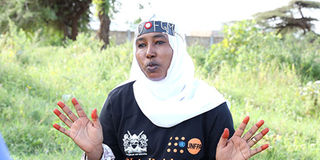Dreaming of an FGM-free Kenya

Sadia Hussein, during an interview at Police Grounds in Isiolo town, Isiolo County. She is an anti-FGM champion.
PHOTO | WAMBUI KUREMA | NATION MEDIA GROUP
She speaks with pain and great courage as she explains the agony she went through after undergoing the cut as a young girl.
Now a grown woman, Sadia Hussein, 33, freshly remembers the suffering she has had to undergo since she underwent female genital mutilation (FGM) as a seven-year-old.
She says she decided to get circumcised after being pressurised by her peers; she did it to avoid being discriminated against.
"I begged my mother to allow me to go through the cut. But after that, I went through a lot of pain. I kept blaming my mother for not warning me about the consequences of being circumcised," she says.
Though the wound eventually healed, she still had to go through the FGM aftermath nightmare during the birth of her three daughters.
SOMALI COMMUNITY
This grim picture has remained memorable; a painful reminder that prompted her to be a voice of reason against the vice, in the much conservative Somali community in Tana River County.
Since 2008, Sadia has been at the forefront of the anti-FGM fight, a campaign she runs through the Dayaa Women Group where she is the coordinator.
Her anti-FGM campaigns have taken her to educational institutions, while at the same time engaging men from her community, an act that was considered a taboo sometime back.
"Until a few years ago, as a woman, I was forbidden, by religion as well as my community's traditions, to stand and address men," she explains.
It is a tradition that still exists, but which she has navigated well, thanks to her courage that has seen her weather through chauvinistic storms and reserve her place as an influential voice in the region.
FGM SURVIVORS
Her campaigns have been successful because of the method she uses to spread the message.
"In my teachings, I always involve a doctor who helps women who have gone through circumcision give birth. They document the medical complications they face during this time," she says.
She also involves FGM survivors in her campaigns where they get a chance to share their experiences as a result of this tradition.
Sadia also involves community leaders in her endeavours, a tactic that helped her especially when she started standing before men and addressing them.
“This was to prepare the men to give me an audience, without which it would have been impossible to pass the message," she adds.
SPORTS TOURNAMENTS
She organises sports tournaments where she uses this platform to sensitise young men at about FGM and its negative impact on their sisters and future wives.
"Marriage has a significant place in our community, and it is the pride of every parent to see their daughters get husbands. However, traditionally in our community, it becomes difficult for women who have not undergone the cut to get married. So through these games, we tell our boys that there's nothing wrong with marrying an uncut woman," she adds.
This, she says, has helped change the narrative for many young men.
SHUJAA
"By doing this, we believe we are "cutting the market" for the circumcised girls, and it will only be a matter of time before parents are forced to rethink about how costly this tradition will be to their daughters in future," she explains.
Her tactics have borne fruits, one of them being, elimination of this tradition in two villages within the county, and declaring them FGM-free zones. Her efforts have also played a part in convincing three former circumcisers to shun this outdated tradition.
For her efforts, she has been recognised variously including Mashujaa Day when she was listed as one of the heroes, as well as having received the Young achievers award.
Though it hasn't been easy for Saida and her anti-FGM campaigns, she continues to push for her dream of an FGM-free Kenya.





